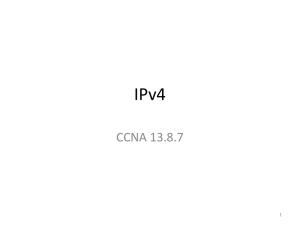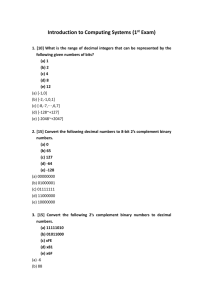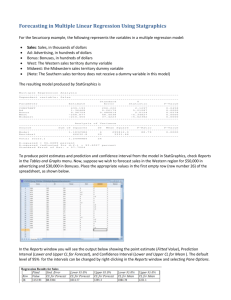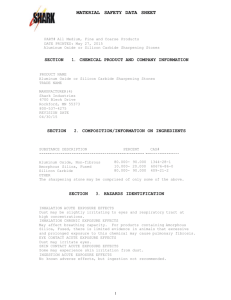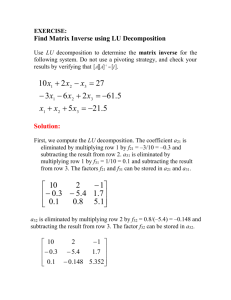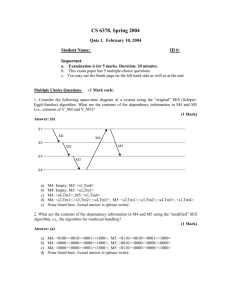ipcalc Documentation
advertisement
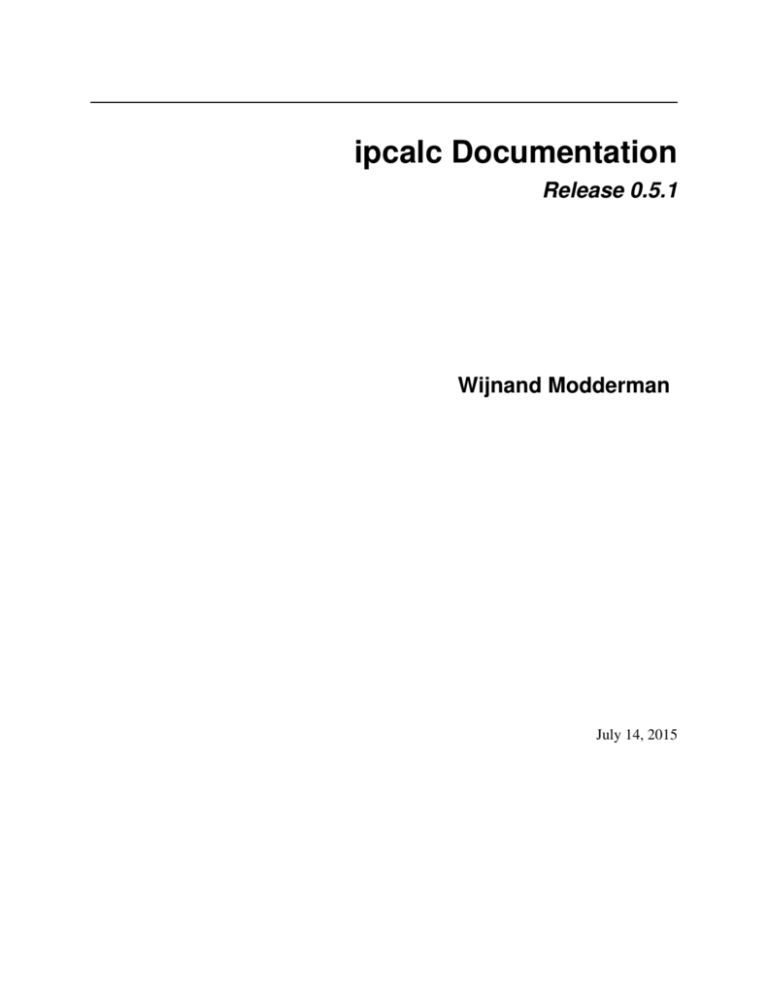
ipcalc Documentation
Release 0.5.1
Wijnand Modderman
July 14, 2015
Contents
1
Example Usage
3
2
Bugs/Features
5
3
Download
3.1 ipcalc IP subnet calculator . . . . . . . . . . . . . . . . . . . . . . . . . . . . . . . . . . . . . .
7
7
4
Indices and tables
11
Python Module Index
13
i
ii
ipcalc Documentation, Release 0.5.1
This module allows you to perform IP subnet calculations, there is support for both IPv4 and IPv6 CIDR notation.
Contents
1
ipcalc Documentation, Release 0.5.1
2
Contents
CHAPTER 1
Example Usage
>>> import ipcalc
>>> for x in ipcalc.Network('172.16.42.0/30'):
...
print str(x)
...
172.16.42.0
172.16.42.1
172.16.42.2
172.16.42.3
>>> subnet = ipcalc.Network('2001:beef:babe::/48')
>>> print str(subnet.network())
2001:beef:babe:0000:0000:0000:0000:0000
>>> print str(subnet.netmask())
ffff:ffff:ffff:0000:0000:0000:0000:0000
>>> '192.168.42.23' in Network('192.168.42.0/24')
True
>>> long(IP('fe80::213:ceff:fee8:c937'))
338288524927261089654168587652869703991L
3
ipcalc Documentation, Release 0.5.1
4
Chapter 1. Example Usage
CHAPTER 2
Bugs/Features
You can issue a ticket in GitHub: https://github.com/tehmaze/ipcalc/issues
5
ipcalc Documentation, Release 0.5.1
6
Chapter 2. Bugs/Features
CHAPTER 3
Download
Get your copy of ipcalc from pypi: http://pypi.python.org/pypi/ipcalc
3.1 ipcalc IP subnet calculator
Note: BSD License
3.1.1 About
This module allows you to perform network calculations.
3.1.2 Changelog
Date
2009-04-11
2009-03-23
2007-10-26
2007-10-25
Changes
Added docstrings.
Added IPv4 short-hand form support, thanks to VeXocide.
Added IPv6 support, as well as a lot of other functions, refactored the calculations.
Initial writeup, because I could not find any other workable implementation.
3.1.3 Todo
Todo:
• add CLI parser
3.1.4 References
References:
• http://www.estoile.com/links/ipv6.pdf
• http://www.iana.org/assignments/ipv4-address-space
• http://www.iana.org/assignments/multicast-addresses
• http://www.iana.org/assignments/ipv6-address-space
7
ipcalc Documentation, Release 0.5.1
• http://www.iana.org/assignments/ipv6-tla-assignments
• http://www.iana.org/assignments/ipv6-multicast-addresses
• http://www.iana.org/assignments/ipv6-anycast-addresses
3.1.5 Thanks
I wish to thank the following people for their input:
• Bastiaan (trbs)
• Peter van Dijk (Habbie)
• Hans van Kranenburg (Knorrie)
• Jeroen Habraken (VeXocide)
• Torbjörn Lönnemark
class ipcalc.IP(ip, mask=None, version=0)
Represents a single IP address.
Parameters ip (IP or str or long or int) – the ip address
>>> localhost = IP("127.0.0.1")
>>> print localhost
127.0.0.1
>>> localhost6 = IP("::1")
>>> print localhost6
0000:0000:0000:0000:0000:0000:0000:0001
bin()
Full-length binary representation of the IP address.
>>> ip = IP("127.0.0.1")
>>> print ip.bin()
01111111000000000000000000000001
clone()
Return a new <IP> object with a copy of this one.
>>> ip = IP('127.0.0.1')
>>> ip.clone()
<ipcalc.IP object at 0x...>
hex()
Full-length hexadecimal representation of the IP address.
>>> ip = IP("127.0.0.1")
>>> print ip.hex()
7f000001
info()
Show IANA allocation information for the current IP address.
>>> ip = IP("127.0.0.1")
>>> print ip.info()
CLASS A
8
Chapter 3. Download
ipcalc Documentation, Release 0.5.1
to_ipv4()
Convert (an IPv6) IP address to an IPv4 address, if possible. Only works for IPv4-compat (::/96) and
6-to-4 (2002::/16) addresses.
>>> ip = IP('2002:c000:022a::')
>>> print ip.to_ipv4()
192.0.2.42
to_ipv6(type=‘6-to-4’)
Convert (an IPv4) IP address to an IPv6 address.
>>> ip = IP('192.0.2.42')
>>> print ip.to_ipv6()
2002:c000:022a:0000:0000:0000:0000:0000
to_tuple()
Used for comparisons.
version()
IP version.
>>> ip = IP("127.0.0.1")
>>> print ip.version()
4
class ipcalc.Network(ip, mask=None, version=0)
Network slice calculations.
Parameters
• ip (IP or str or long or int) – network address
• mask (int or str) – netmask
>>> localnet = Network('127.0.0.1/8')
>>> print localnet
127.0.0.1
broadcast()
Broadcast address.
>>> localnet = Network('127.0.0.1/8')
>>> print localnet.broadcast()
127.255.255.255
has_key(ip)
Check if the given ip is part of the network.
Parameters ip (IP or str or long or int) – the ip address
>>> net = Network('192.0.2.0/24')
>>> net.has_key('192.168.2.0')
False
>>> net.has_key('192.0.2.42')
True
host_first()
First available host in this subnet.
host_last()
Last available host in this subnet.
3.1. ipcalc IP subnet calculator
9
ipcalc Documentation, Release 0.5.1
in_network(other)
Check if the given IP address is within this network.
netmask()
Network netmask derived from subnet size.
>>> localnet = Network('127.0.0.1/8')
>>> print localnet.netmask()
255.0.0.0
network()
Network address.
>>> localnet = Network('127.128.99.3/8')
>>> print localnet.network()
127.0.0.0
size()
Number of ip’s within the network.
>>> net = Network('192.0.2.0/24')
>>> print net.size()
256
10
Chapter 3. Download
CHAPTER 4
Indices and tables
• genindex
• modindex
• search
11
ipcalc Documentation, Release 0.5.1
12
Chapter 4. Indices and tables
Python Module Index
i
ipcalc, 7
13
ipcalc Documentation, Release 0.5.1
14
Python Module Index
Index
B
bin() (ipcalc.IP method), 8
broadcast() (ipcalc.Network method), 9
C
clone() (ipcalc.IP method), 8
H
has_key() (ipcalc.Network method), 9
hex() (ipcalc.IP method), 8
host_first() (ipcalc.Network method), 9
host_last() (ipcalc.Network method), 9
I
in_network() (ipcalc.Network method), 9
info() (ipcalc.IP method), 8
IP (class in ipcalc), 8
ipcalc (module), 7
N
netmask() (ipcalc.Network method), 10
Network (class in ipcalc), 9
network() (ipcalc.Network method), 10
S
size() (ipcalc.Network method), 10
T
to_ipv4() (ipcalc.IP method), 8
to_ipv6() (ipcalc.IP method), 9
to_tuple() (ipcalc.IP method), 9
V
version() (ipcalc.IP method), 9
15


